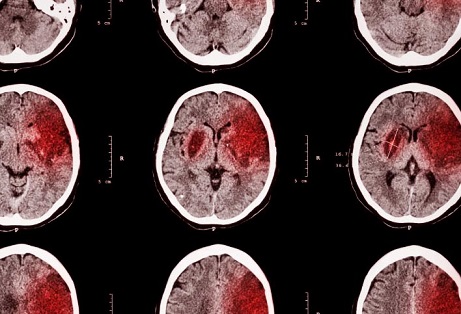COVID-19 can cause the onset or aid in the progression of Alzheimer’s disease, ischemic stroke, and multiple sclerosis
Nikhil Prasad Fact checked by:Thailand Medical News Team Sep 01, 2024 1 year, 3 months, 3 weeks, 4 days, 23 hours, 10 minutes ago
Medical News: COVID-19 pandemic has had a profound impact on global health, affecting not only the respiratory system but also causing significant neurological complications. Recent studies have begun to shed light on the potential of COVID-19 to trigger or exacerbate neurological diseases such as Alzheimer's disease, ischemic stroke, and multiple sclerosis. Researchers from the Medical University of Bialystok in Poland have explored these connections, highlighting the critical need to understand the broader impacts of SARS-CoV-2 beyond its immediate respiratory effects.
 COVID-19 can cause the onset or aid in the progression of Alzheimer’s disease, i
COVID-19 can cause the onset or aid in the progression of Alzheimer’s disease, i
schemic stroke, and multiple sclerosis
COVID-19 and Its Neurological Impact
COVID-19, caused by the SARS-CoV-2 virus, is primarily known for its severe respiratory symptoms. However, as the pandemic progressed, it became evident that the virus could invade the central nervous system (CNS), leading to a range of neurological symptoms, from mild headaches and confusion to severe outcomes like stroke and neurodegenerative diseases. This
Medical News report explores the findings of a study that delves into how COVID-19 can be linked to the onset or worsening of Alzheimer's disease, ischemic stroke, and multiple sclerosis.
The Connection to Alzheimer's Disease
Alzheimer's disease (AD) is a progressive neurodegenerative disorder that leads to memory loss, cognitive decline, and eventually, loss of independence. It is characterized by the accumulation of amyloid-beta plaques and tau tangles in the brain. The researchers from the Medical University of Bialystok found that COVID-19 could exacerbate the progression of Alzheimer's disease through several mechanisms.
The SARS-CoV-2 virus is known to cause systemic inflammation, which is a key feature in the progression of Alzheimer's. The study notes that the virus can enhance the production of pro-inflammatory cytokines, leading to increased oxidative stress and further damage to the brain. Additionally, the presence of the ACE2 receptor, which is elevated in Alzheimer’s patients, facilitates the virus’s entry into brain cells, accelerating the disease's progression. The researchers emphasize that the interaction between the virus and these receptors is crucial in understanding how COVID-19 can worsen Alzheimer's disease.
Moreover, the study highlights the role of genetic factors, particularly the ApoE ε4 allele, which is commonly found in Alzheimer's patients. This allele not only increases the risk of developing Alzheimer’s but also enhances the susceptibility to severe COVID-19 infections, making these patients more vulnerable to accelerated cognitive decline.
Ischemic Stroke and COVID-19
Ischemic stroke occurs when a blood clot obstructs the flow of blood to the brain, leading to cell death and potentially severe neurological damage. The study reveals t
hat COVID-19 significantly increases the risk of ischemic stroke, particularly in patients with pre-existing conditions like hypertension, diabetes, and hyperlipidemia.
The researchers discovered that SARS-CoV-2 can directly affect the blood vessels in the brain, leading to vasculitis, endothelial damage, and increased blood clot formation. The virus triggers a hyperinflammatory response, commonly known as a cytokine storm, which further exacerbates blood clotting and increases the risk of stroke. This hypercoagulability is particularly dangerous in COVID-19 patients and is a critical factor in the high incidence of stroke observed in these individuals.
Interestingly, the study also found that COVID-19 can induce hypoxia (low oxygen levels) in patients, which contributes to the formation of blood clots and subsequent strokes. The virus's ability to disrupt normal blood flow and oxygen delivery to the brain underscores the importance of closely monitoring COVID-19 patients for signs of stroke, especially those with existing risk factors.
Multiple Sclerosis and the Exacerbation by COVID-19
Multiple sclerosis (MS) is an autoimmune disorder characterized by the immune system attacking the myelin sheath that protects nerve fibers in the CNS, leading to progressive neurological decline. The study from the Medical University of Bialystok highlights how COVID-19 could act as a trigger for MS exacerbation.
COVID-19's impact on the immune system is profound. The virus induces a strong inflammatory response, which can worsen the already delicate balance in MS patients. The study found that SARS-CoV-2 can increase the production of neurotoxic cytokines such as IL-1β and IL-6, leading to further demyelination and nerve damage. Moreover, the virus’s interaction with the immune system can disrupt mitochondrial function in neurons, contributing to the progression of MS by impairing energy production and increasing oxidative stress.
Furthermore, the researchers noted that COVID-19 might trigger the development of MS in individuals who are genetically predisposed to the disease. The virus's ability to activate the NLRP3 inflammasome, a key player in the immune response, is linked to both the progression of MS and the severity of COVID-19, creating a dangerous interplay between the two conditions.
Conclusion
The relationship between COVID-19 and neurological diseases is complex and multifaceted. The study findings indicate that COVID-19 can indeed trigger or exacerbate conditions like Alzheimer's disease, ischemic stroke, and multiple sclerosis through various mechanisms involving systemic inflammation, immune system dysregulation, and direct viral invasion of the CNS. This understanding is crucial as it not only helps in managing COVID-19 patients with pre-existing neurological conditions but also raises awareness about the potential long-term neurological impacts of the virus.
The study findings were published in the peer-reviewed International Journal of Molecular Sciences.
https://www.mdpi.com/1422-0067/25/16/8715
For the latest COVID-19 news, keep on logging to Thailand
Medical News.
Read Also:
https://www.thailandmedical.news/news/breaking-sars-cov-2-causes-type-i-interferon-signaling-dysregulation-in-olfactory-networks-with-implications-of-risk-for-alzheimer-s-disease
https://www.thailandmedical.news/news/breaking-news-latest-study-covering-23-million-patients-shows-that-post-covid-individuals-have-a-63-7-percent-risk-of-developing-ischemic-stroke
